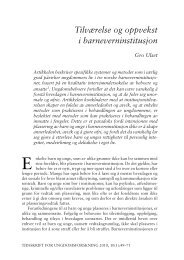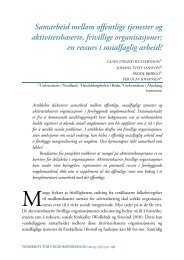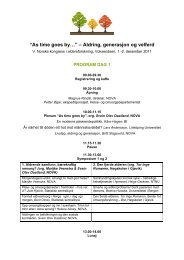Parents' socioeconomic status and children's academic ... - Nova
Parents' socioeconomic status and children's academic ... - Nova
Parents' socioeconomic status and children's academic ... - Nova
Create successful ePaper yourself
Turn your PDF publications into a flip-book with our unique Google optimized e-Paper software.
points, controlling for the other variables. In the following paragraphs, we<br />
explore coefficients of some dummy sets. Furthermore, we use the estimated<br />
regression equation to predict the expected levels of the grades for the pupils.<br />
4.2.1 Gender<br />
Gender is among the essential analytical dimensions in social education<br />
research. In the Norwegian context, studies show that girls achieved better<br />
results than boys do in basic school. Anders Bakken (2008), for example, in<br />
his study of gender differences at basic school, found that girls do on average<br />
better than boys. Breaking down the same analysis by minority (immigrant)<br />
background, he found gender variation to be lower. Further, he analysed<br />
gender differences with relation to parental education level. In this analysis<br />
he found gender differences in <strong>academic</strong> achievement among pupils whose<br />
parent have not completed secondary level education to be higher than<br />
among pupils whose parents had a university degree (Bakken 2008). The<br />
data set used in this study shows clear gender variation in term of pupils’<br />
results in individual subjects (Kristofersen 2008). In terms of the total sum of<br />
the three subjects, the result is shown by multivariate analysis. The<br />
coefficient of the gender dummy variable shows that the girls achieve better<br />
results than boys by about 0.47 points. With a t-value of 2.2, this result is<br />
also significantly larger than zero.<br />
4.2.2 Parents’ Education<br />
The education coefficients are positive, indicating that a pupil whose parents’<br />
education level is not registered is expected to show a lower performance<br />
than others. This pattern is significantly identified. Those whose parents<br />
have basic education only do not differ significantly from those whose<br />
parents’ education is unregistered, but apart from that, the coefficient values<br />
increase with increasing educational level. This confirms the positive<br />
association between parent’s education level <strong>and</strong> children’s performance,<br />
which was demonstrated by bivariate methods earlier in the paper. Figure<br />
(10) illustrates this result <strong>and</strong> shows the effect of parental education on<br />
children’s achievement, controlling for other factors.<br />
– Parents’ <strong>socioeconomic</strong> <strong>status</strong> <strong>and</strong> children’s <strong>academic</strong> performance – 45

















